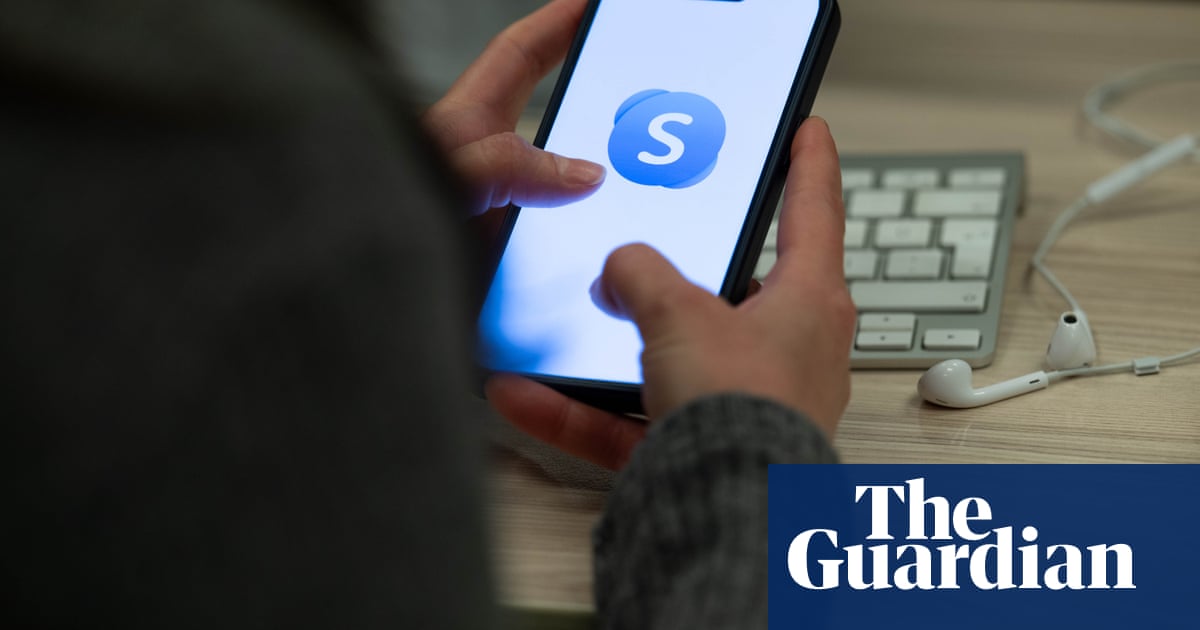Idoubt many people are mourning the demise ofSkype. The sky-blue platform that revolutionized the video call,themedium for long-distance relationships in the early 2010s, had not been relevant for almost a decade when Microsoft announced its impending death. My own relationship with Skype’s clunky tangle of video, voice and chat peaked in 2011 – the same year Microsoft purchased it for a headline-making $8.5bn, only to let it wither in the shadow of professionalized, less-pixelated options. By 2014, it was basically obsolete, as video calls shifted to more integrated apps like FaceTime, and my college schedule did not allow for glitchy, hours-long catchups. Snapchat was far more efficient.
Like most people, I barely touched Skype from the mid-2010s on; the news that Microsoft will shutter it on 4 May and fold its data into the free version of Teams prompted me to log back in for the first time in five years. All that remained of my formerly thriving Skype life – once a log of video calls picked up and put down, peppered with chats pleading to “pleaseeeeeeee call me back bitchhhh (:” – were a handful of spam crypto chats and phishing links from former favorites who had long quit the platform, as well.
Still, I must pour one out for Skype, a place where I would spend whole nights in 2011 gabbing over murky video, a form and era of technology I associate with a spectral, critical, inarticulable valence of intimacy that also feels bygone. I lavished hours and hours and hours on the platform in high school, catching up with my older friends who slipped the bounds of our town for university, or sussing out kids from other states I met on college visits, or desperately trying to keep my older unofficial boyfriend’s attention despite all signs pointing to him moving on.
Skype was an island of intimacy – more than text but not quite the real thing – that tangled emotions and refracted IRL life in ways difficult to explain. It was the tether to people outside my small world – people older than me, cooler than me, going to more parties than me. A whole night on Skype video hearing a friend recap his escapades of pledging a fraternity, clinging to the fact that he still wanted to talk to me. A nebulous romantic relationship kept alive by the semblance of intimacy and the promise of access – we could do homework together, my bedroom to his student lounge. I could meet the two-dimensional versions of his friends. A perpetual state of will-they-won’t-they without any prospect of seeing each other, or a fleeting new friendship processing the death of a mutual friend in long, desperate gulps of connection – that was all over Skype.
And that was all forgotten, siloed to a particular platform and a particular time, when digital relationships seemed to me a strange, new liminal realm, not an everyday facet of life and before my attention splintered into minute-long intervals. If people are talking about Skype these days, it’s probably in relation to the movie Past Lives, which depicted a relationship over several decades and captured that peculiar intimacy in a chapter of intense, inexpressibly important reconnection over video call. For the film’s release in 2023, Iwroteabout how the writer-director Celine Song’s inclusion of the classicSkype theme music– that interminable and annoyingly peppy sonar into the deep digital abyss – portaled me straight back to 2011, the same year Nora Moon (Greta Lee) began long-distance video-chatting with her childhood sweetheart Hae Sung (Teo Yoo). Song effectively and accurately rendered the heady rush of long-distance intimacy, the formative kind forgotten under the layers of real life that came after – curled up in bed on hours-long calls, rushing to beat the ringtone clock, awkwardly papering over glitches and lags.
The predominant feeling of Past Lives is the predominant feeling, for me, of Skype: yearning – for a bigger world, for renewed attention, for a bond to remain in place. For a person you could not actually be with. For some way to describe all the emotions caught up in “Skyping”. For the hope that these long video calls could actually substitute for the real thing. It is admittedly difficult to disentangle this yearning from nostalgia for a simpler time with fewer demands on our attention, less omnipresent connection, less overwhelm. When now-faded relationships still had some road left, when tech interfaces felt clumsy and rough, because they were so new. When youth allowed for an endless sense of possibility, and when the intangible weight of relationships, friend or lover or somewhere in between, rested on this hallowed, janky portal to another laptop. The other person haloed in blue light, there but not.
The locus of long-distance connection has long shifted elsewhere, taken root and entwined with normal life. You can now FaceTime someone, text them and check their other digital beams – their Instagram Stories, their Letterboxd logs, their Strava workouts, even their real-time location – from the same screen, in the same minute, with the same impulse. The video quality evolved and proliferated. I got older, and long-distance connection became more a puzzle of screens and streams and time to optimize, less an escape. And Skype straggled on as one of our most ephemeral digital artifacts; there islittle for the digital hoarderin its remnants. Unlike text messages or camcorder video or iPhotos or the never-deleting Facebook timelines, there is no archive, no vastlibrary of video to parse through.
Sign up toTechScape
A weekly dive in to how technology is shaping our lives
after newsletter promotion
Instead, I remember it as a fleeting repository of time and feeling – so much put in, no way to ever measure it or see it again. It wasn’t real life, but it was good enough then,the chipper sound and grainy texture and eager openness of an era. RIP.
